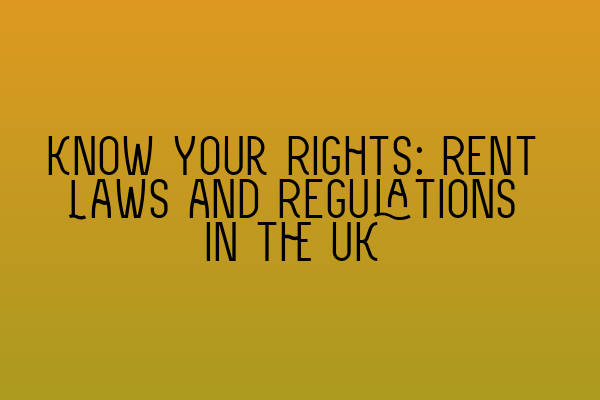Know Your Rights: Rent Laws and Regulations in the UK
Renting a property in the UK can be a daunting experience, especially if you’re unfamiliar with the laws and regulations surrounding it. Understanding your rights as a tenant is crucial in order to ensure a fair and smooth rental experience. In this blog post, we will provide you with an overview of the rent laws and regulations in the UK, helping you know your rights and make informed decisions. Let’s dive in!
Assured Shorthold Tenancies (ASTs)
The majority of residential tenancies in the UK are assured shorthold tenancies (ASTs). Under an AST, you have the right to occupy the property for a fixed term, usually six or twelve months. This provides you with a certain level of security and stability.
As a tenant under an AST, you have several rights and responsibilities. It’s important to familiarize yourself with these to ensure a smooth tenancy. For example, you have the right to live in a property that is safe and in a good state of repair. The landlord is responsible for maintaining the property and ensuring that it meets certain standards.
However, as a tenant, you also have certain responsibilities. You must pay your rent on time, take good care of the property, and report any maintenance issues to the landlord or letting agent promptly.
Security of Tenure
Security of tenure refers to the right to remain in the property beyond the fixed term of the tenancy. In the past, landlords had the power to evict tenants without providing a reason. However, the UK government has introduced measures to provide tenants with greater security.
Under the Housing Act 1988, tenants have the right to request a new tenancy or to remain in the property even after the fixed term has ended. This gives you peace of mind, knowing that you cannot be asked to leave without proper notice or a valid reason.
Rent Increases
Rent increases can be a contentious issue between landlords and tenants. While landlords have the right to increase the rent, they must follow certain procedures and provide proper notice.
Under an AST, landlords must give you at least one month’s notice before increasing the rent. If you have a fixed-term tenancy, the rent can only be increased when the fixed term ends. If you have a periodic tenancy (rolling from month to month), the rent can be increased with proper notice.
It’s important to be aware of your rights regarding rent increases to avoid any potential disputes. If you believe that the rent increase is unreasonable, you can challenge it by negotiating with your landlord or seeking advice from a legal professional.
Repairs and Maintenance
As a tenant, you have the right to live in a property that is safe, well-maintained, and in good repair. If there are any repairs that need to be carried out, it is the landlord’s responsibility to address them promptly.
If you notice any issues with the property, such as leaks, electrical problems, or structural defects, you should report them to your landlord or letting agent as soon as possible. They are legally obliged to arrange for repairs and maintenance.
In some cases, landlords may attempt to shift the responsibility of repairs onto the tenant, claiming that it is their negligence or misuse that caused the problem. It’s important to document any communication and seek legal advice if you believe that the landlord is not fulfilling their repair obligations.
Evictions
The process of eviction can be stressful and overwhelming for tenants. However, landlords can only evict you if they have valid grounds and follow the proper legal procedures.
If you are on an AST, landlords must give you notice before seeking possession of the property. The notice period can vary depending on the reason for eviction. It’s important to carefully review the notice and seek legal advice if you believe it is not valid or if you need more time to find alternative accommodation.
It is worth noting that the eviction process can take time, and landlords cannot simply change the locks or forcefully remove you from the property without obtaining a court order.
Seeking Legal Advice
If you have concerns about your rights as a tenant or if you are facing any issues with your landlord, it is advisable to seek legal advice. A solicitor who specializes in property law can provide you with expert guidance and help you understand your rights and legal options.
At SQE Property Law & Land Law, we offer professional legal services that can assist you in navigating the complex world of rent laws and regulations. Whether you need advice on a tenancy agreement, assistance with a dispute, or representation in court, our team of experienced solicitors is here to help.
For more information, please visit our website or contact us directly. We also offer SQE 1 Practice Exam Questions and SQE 1 Practice Mocks FLK1 FLK2 to help candidates prepare for the SQE exams. Check out our SQE 2 Preparation Courses and SQE 1 Preparation Courses for more details. Stay informed with the latest SRA SQE Exam Dates by following the link.
Knowing your rights as a tenant is crucial for a positive rental experience. By familiarizing yourself with the rent laws and regulations in the UK, you can confidently assert your rights and ensure a fair and secure tenancy.
Disclaimer: This blog post is for informational purposes only and should not be construed as legal advice. Consult with a legal professional for personalized advice regarding your specific situation.
